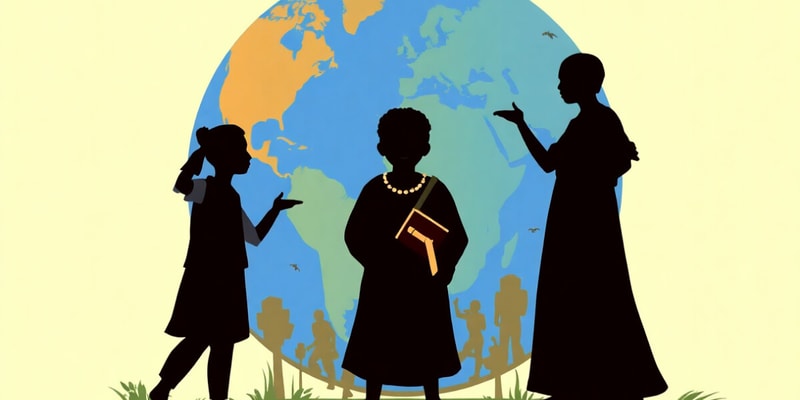Podcast
Questions and Answers
Which of these are not included in the micro environment?
Which of these are not included in the micro environment?
What is the time frame for the Sustainable Development Goals (SDGs)?
What is the time frame for the Sustainable Development Goals (SDGs)?
The Millennium Development Goals (MDGs) focused primarily on reducing extreme poverty and improving basic human needs in developing countries.
The Millennium Development Goals (MDGs) focused primarily on reducing extreme poverty and improving basic human needs in developing countries.
True
What is the main goal of the ASEAN Tourism campaign?
What is the main goal of the ASEAN Tourism campaign?
Signup and view all the answers
What year was the Pacific Asia Travel Association (PATA) established?
What year was the Pacific Asia Travel Association (PATA) established?
Signup and view all the answers
Which of the following is NOT a characteristic of tourism as a service?
Which of the following is NOT a characteristic of tourism as a service?
Signup and view all the answers
What does the "Tourism for All" concept ensure?
What does the "Tourism for All" concept ensure?
Signup and view all the answers
Which of the following is a requirement for hotels and accommodations, as outlined in the National Accommodation Standards?
Which of the following is a requirement for hotels and accommodations, as outlined in the National Accommodation Standards?
Signup and view all the answers
Which of the following IS NOT an element of inclusive tourism as described by Scheyvens and Biddulp (2017)?
Which of the following IS NOT an element of inclusive tourism as described by Scheyvens and Biddulp (2017)?
Signup and view all the answers
The "Magna Carta for Disabled Persons" (Republic Act No. 7277) specifically requires that all hotels and accommodations must have separate facilities for senior citizens
The "Magna Carta for Disabled Persons" (Republic Act No. 7277) specifically requires that all hotels and accommodations must have separate facilities for senior citizens
Signup and view all the answers
Which of the following organizations is responsible for promoting and defending the interests of the hotel and restaurant industry worldwide?
Which of the following organizations is responsible for promoting and defending the interests of the hotel and restaurant industry worldwide?
Signup and view all the answers
What is the main objective of the Philippine Commission on Sports Scuba Diving (PCSSD)?
What is the main objective of the Philippine Commission on Sports Scuba Diving (PCSSD)?
Signup and view all the answers
Match the following organizations with their main focus:
Match the following organizations with their main focus:
Signup and view all the answers
Study Notes
Millennium Development Goals (MDGs)
- Timeframe: 2000-2015
- Focus: Reducing extreme poverty and improving basic human needs in developing countries
- Number of Goals: 8
- Key Areas: Eradicate extreme poverty and hunger, achieve universal primary education, promote gender equality, reduce child mortality, improve maternal health, combat HIV/AIDS, ensure environmental sustainability, develop a global partnership for development
Sustainable Development Goals (SDGs)
- Timeframe: 2015-2030
- Focus: Broader and more comprehensive, addressing sustainable development issues applicable to all countries
- Number of Goals: 17
- Key Areas: No Poverty, Zero Hunger, Good Health and Wellbeing, Quality Education, Clean Water and Sanitation, Affordable and Clean Energy, Decent Work and Economic Growth, Gender Equality, Industry, Innovation and Infrastructure, Reduced Inequalities, Sustainable Cities and Communities, Responsible Consumption and Production, Climate Action, Life Below Water, Life on Land, Peace, Justice and Strong Institutions, Partnerships for the Goals
Macro Environment
- Broad forces affecting all businesses in an industry
- Factors include political factors (government policies, stability), economic factors (inflation, growth), social factors (culture, trends), technological factors (innovations), and environmental factors (climate change, regulations)
Micro Environment
- Factors close to the company that influence its ability to serve customers
- Factors include customers (preferences), suppliers (relationships), competitors (other businesses offering similar services/products), and intermediaries (distributors, retailers)
- Law of demand: inverse relationship between price and quantity purchased (price decreases, quantity demanded increases)
Tourism Demand
- Desire and willingness of people to travel
- Factors affecting demand: economic conditions, cultural attractions, natural beauty, marketing efforts
- Demand substitution: tourists selecting alternative destinations or activities due to factors like price or availability changes
- Demand redirection: encouraging tourist visits to less popular destinations to reduce pressure on crowded areas
Tourism Value Chain
- Full range of activities and services involved in delivering a complete tourism experience
- Includes planning, booking, travel, activities, and post-trip services
- Tangible aspects (products): accommodation, transportation, attractions, souvenirs
- Intangible aspects (services): customer service, experiences, convenience
Tourism as a Service (Tangible and Intangible)
- Intangibility: Services cannot be seen, touched, or tried before purchase
- Services are produced and consumed simultaneously (inseparability)
- Quality of service can vary depending on the provider and circumstances (variability)
- Tourism services are perishable (cannot be stored)
- Seasonality impacts tourism demand (often fluctuating with seasons, holidays, and events)
Global Organizations
- United Nations World Tourism Organization (UNWTO): Promotes responsible, sustainable, and universally accessible tourism
- World Travel and Tourism Council (WTTC): Represents the global travel and tourism private sector, promoting its role
- Pacific Asia Travel Association (PATA): Promotes and facilitates intra-regional travel within Southeast Asia and the Pacific region
- International Hotel and Restaurant Association (IHRA): Represents the global hospitality industry
Other Important Information
- Atmosphere: Overall feeling and ambiance of a destination (local culture, environment, interactions with locals)
- Duty-Free Philippines Corporation (DFPC): Operates tax-free merchandising systems in the Philippines
- Intramuros Administration (IA): Responsible for the restoration and development of Intramuros
Studying That Suits You
Use AI to generate personalized quizzes and flashcards to suit your learning preferences.
Related Documents
Description
This quiz explores the differences and similarities between the Millennium Development Goals (MDGs) and the Sustainable Development Goals (SDGs). Learn about the key areas each set of goals focuses on and the timeframe in which they were established, highlighting their impact on global development issues.




